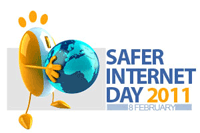
 |
|
 |
 |
Project partner |
|
 |
| Under the Strengthening Serbia-EU Civil Society Dialogue Project, funded by the European Union and managed by the Delegation of the European Union to the Republic of Serbia
|
 |
|

International Aid Network (IAN), an NGO from Belgrade , in collaboration with the Spanish NGO - Esplai organized a joint conference which took place on the 24 th and 25 th of May 2011, and was devoted to e-inclusion as part of the program called "Click to Europe ". Aim of this conference was to promote and contribute to the digital inclusion of people (above all the vulnerable groups), businesses and communities in Serbia.
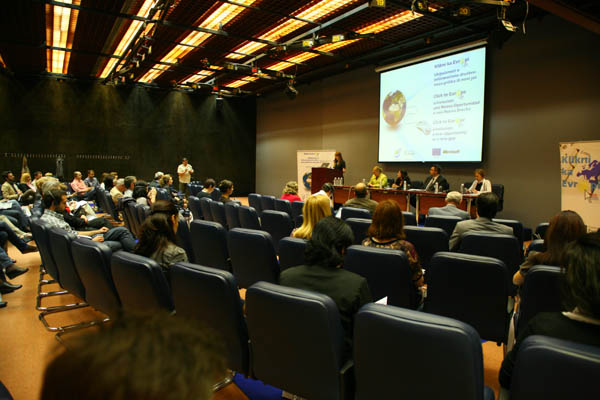
During the first day of the conference guests had the opportunity to hear about the current situation of digital literacy in Spain, Lithuania, Romania, United Kingdom, Germany, Croatia and Serbia .
| All present were firstly introduced to current situation in Serbia which was presented by the Deputy Minister for Digital Agenda Ms. Jasna Matic, who emphasized the importance of digitalization particularly in the way we approach new economic and educational opportunities. Ms. Matic also introduced a set of policies and projects which were implemented by the government in order to, as quickly and easily as possible, catch up with the rest of the world in the field of digital inclusion, whilst she paid special attention, to projects which involve programs such as a " Digital School " and "Safety on the Internet". | 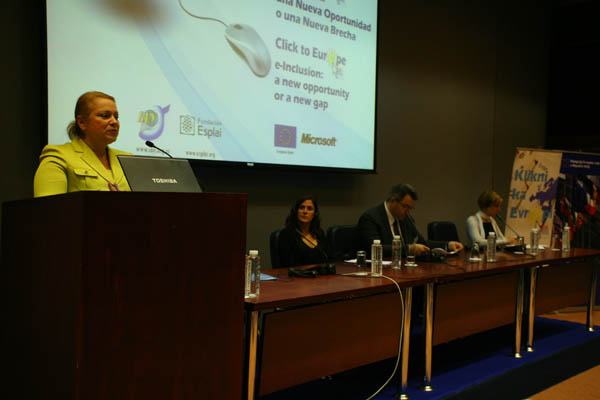 |
Presentation regarding the current situation in Spain, was given by Ms. Almudena Garcia Padilla, coordinator of strategy for "Digital Citizen" and the "Plan for Advances, " within the Spanish Ministry of Industry, Tourism and Trade. Convergence of information and communication technology (ICT) is intended for all segments of the population with a special emphasis on the older population, as well as the population in rural areas, whilst not forgetting any members of society which are in the penitentiary system. Ms. Garcia Padilla pointed out the significance of cooperation with regional governments and NGOs, without which it would not have been possible to establish 3000 telecentres throughout Spain thus significantly improving individuals' quality of life.
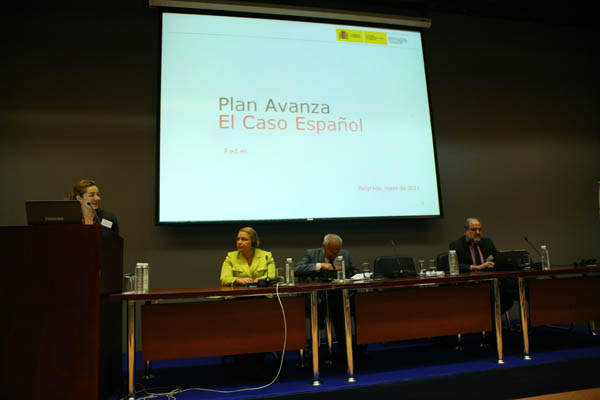
That the world economic crisis is not bypassing Iberian Peninsula , confirmed Mr. Richard Faure, Head of the department of the Information Society. However, Catalonia is trying to follow trends which have been imposed by Europe . Priority has been placed on digital integration of all citizens, subsequently followed by implementation of broadband Internet, via a program called "Open Network", whose goal is to further contribute to population connectivity. Mr. Jose Manuel Perez from the Spanish NGO - Esplai further acquainted the audience with the workings of a "Red Connect" network.
Mr. Nikola Markovic acted as the representative of the IT Society of Serbia and addressed the attendees regarding matters, such as the increasing gap between the population residing in cities and those in rural areas, as well as that between the wealthy and the poor. In addition to being presented with the basic problems which hinder digital inclusion, he reminded those present that investment in information technology is actually a capital investment for Serbia and its economy.
 |
Mr. Ian Clifford, Head of Policy and Business Development department in Great Britain , with his memorable presentation, wanted to point out to the audience how important it is to know how to use the computer and the internet. In his attempt to better portray their importance in a contemporary society, Mr. Clifford equated digital inclusion with a real life issues such as that of "Being alive means being online". |
Situation in the neighboring Croatia , those gathered could hear from Mr. Zarka Cizmar, Director of Telecentre Zagreb. Media literacy is something that is imposed on everyone as one of the key requirements, which is necessary for an individual to actively participate in today's knowledge society.
A first day of the conference was closed with a session which was devoted to establishment of new telecentres, schools and libraries. Spiking about this issue were: Ms. Dragana Milanovic, who represented the National Library of Belgrade, Mr. Kestutis Juskevicius, a representative of the National Library of Lithuania, Mr. Mirko Markovic, on behalf of the Belgrade City Library and Ms. Virginia Pareja Vallina, a Project Manager for the Esplai organization in Spain.
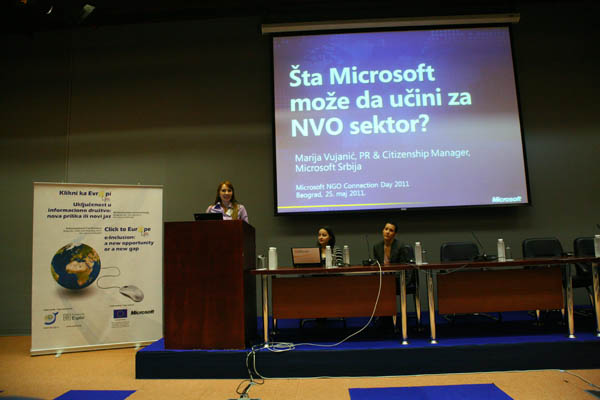
Beginning of the second day of the conference was reserved for the session titled "Microsoft day for connecting with the civil society". Ms. Marija Vujanic, a PR and a Citizenship Manager at Microsoft, presented the way in which this company can enable organizations in the NGO sector to realize their full potential. Citizenship Program is a means of support to local innovation and professional empowerment of NGOs through donations such as software, technical support and online training.
Microsoft representatives have pointed out a long and successful cooperation with IAN, through training for the unemployed, refugees, Roma and other members of vulnerable groups. Besides the previously mentioned, Ms. Vujanic also emphasized the significance of cooperation between the NGO sector and large companies, whilst discussing possible grants and conditions necessary for implementation of training courses.
In addition to the previously mentioned speakers, a guest from Germany , Mr. Sven Weber, project manager for the Foundation for digital opportunities, introduced the concept of digital inclusion in Germany and highlighted the role of social workers in training of high-risk groups. These individuals are in constant contact with members of risk groups, and their potential should thus be utilized in programs regarding digital inclusion by establishing them as trainers in the field.
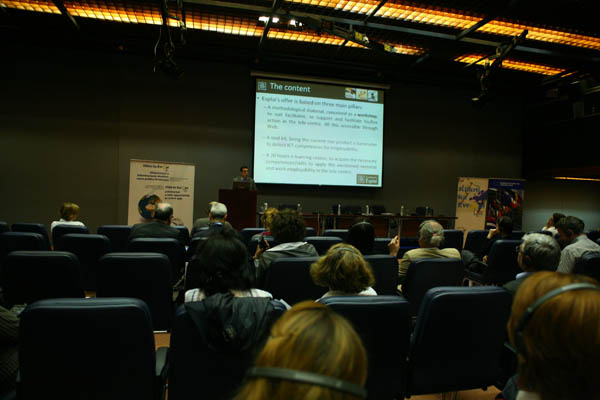 |
Mr. Perdo Aguilera Cortés spoke on the significance of training various members of the Roma population as well as regarding Spanish experiences in implementation of previously mentioned programs amongst the Roma. He stressed the importance of educating women and youth in these communities which represent the driving force for change. Ms. Ivana Vidakovic from IAN, emphasized few psychological benefits that accompany training in the field of ICT. Whilst talking about education of women from vulnerable groups, she highlighted numerous advantages which such courses may have: gaining of computer knowledge and skills, increase employability, increasing revenues, development of positive behavior, higher self-confidence and improved social skills and integration. |
These talks were followed by sessions devoted to assistive technologies presented as a means of support and inclusion of people with disabilities into the world of ICT. Ms. Tamara Blagojevic, Coordinator of EHO Resource center for people with disabilities (PWD) spoke regarding computer aid available to PWD. There was also a specialized computer software designed for the blind which was presented, whilst mentioning previous workings and experiences which have been noted in certain schools for the blind and visually impaired.
Other matters discussed at the conference were issues such as the role of ICT in the lives of women and how important it is for them to undergo proper training in this field. Ms. Jasmina Stanic, Provincial Secretary of Labour and Gender Equality, said that the promotion of digital inclusion should be imperative in the contemporary society, and a means for gender equality which is to be used as resource against social exclusion of vulnerable groups. Audience was then addressed by Mrs. Gordana Stankov Stojilovic from IAN who proceeded to present two projects, concerning unemployed and penurious women, both of which have been successfully implemented in this organization. |
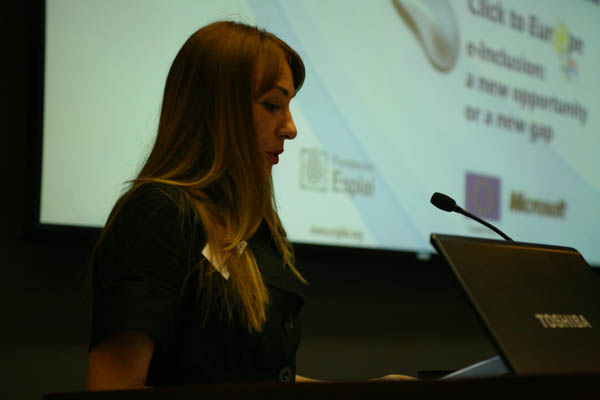 |
Final session was devoted to importance of ICT for rural population - one of the vulnerable groups. There was a discussion regarding various experiences which were acquired in Spain as well as in Serbia . New ideas, approaches, and solutions to the existing problems where offered.
Impressions regarding training held in the IAN-Telecentar, were provided by numerous users which praised various individuals, which helped them progress, find employment, as well as their unique place in society.
This conference provided an excellent opportunity for colleagues from several European countries to exchange their experiences and ideas. The conference was closed with a clear message regarding the greave importance of including all strata of society into today's digitized reality. Success of such a mission, requires collaboration and joint efforts from both the civil organizations and the public sector, as well as corporations and companies.
Please see the page Resources with the presentation of all participants, the page Photos with photos from the conference or watch the video .
Project supported by: EU Delegation to Serbia and Microsoft .
Venue: Sava Centar, Milentija Popovica Street 9, Belgarde, Serbia
Detailed conference agenda is given here.
List of speakers is here.
For additional information, please contact Gordana Stankov Stojilovic.
IAN International Aid Network, Admirala Geprata 10, Belgrade , +381 11 7617 197
Home | About us | Departments | Publications | Events | Contact
International Aid Network, Admirala Geprata Street 10, 11000 Belgrade, Serbia, 011/ 7617 197 i 011/ 7617 205,
Copyright © 2007 International Aid Network, Belgrade, Serbia
Unless otherwise specified, all product names appearing in this Internet site are trademarks owned by or licensed to International Aid Network. No use of any International Aid Network trademark, trade name, or trade dress in this site may be made without the prior written authorization of International Aid Network, except to identify the product or services of the company.



